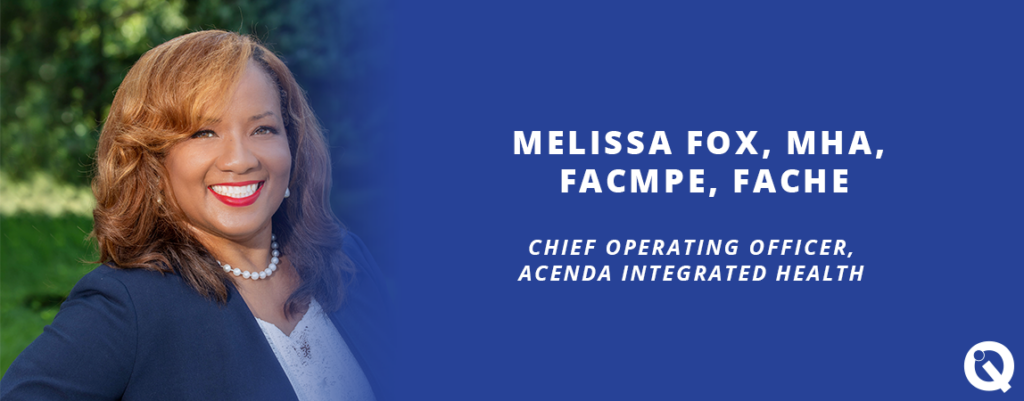Melissa Fox, MHA, FACMPE, FACHE, is Chief Operating Officer of Acenda Integrated Health, a member of the Quality Institute’s Provider Council.
Acenda was selected by the Robert Wood Johnson Foundation to be the incubator organization for the creation of a public health institute in New Jersey. What can you tell us about where you are in that process and the steps ahead?
First, we’re so honored and humbled to have been selected for this by RWJF, and there’s been so much hard work in New Jersey already in laying the groundwork for the opening of the new Public Health Institute. I wanted to be sure to acknowledge and celebrate that important foundation.
In terms of where we are in the process, we’ve been doing a lot of listening to, and learning from, local public health officials and statewide public health leaders. We’re working very closely with the NJ Department of Health and of course the Robert Wood Johnson Foundation as well as the National Network of Public Health Institutes on the priorities and structure for the PHI, and how the entity can best engage locally and statewide in support of health equity. We created an informational website for communities to learn more about the PHI and its role.
It’s key that this will be the first Public Health Institute in the country that is founded on a principle of health equity. We want to include the voices of environmental justice representatives, social justice leaders – and many others who have been on the front lines of reducing health disparities. We spent a lot of time hearing what they would want from a Public Health Institute in order to best inform the PHI’s programming.
We are now moving to the point where we’re assembling the Board of Directors. We have completed the application process and are almost at the point where we’re ready to announce those names. And after that, very quickly we’re going to start hiring staff for the Public Health Institute … an executive director and then the rest of the staff.
How do you envision a Public Health Institute and its role in improving the health of people in New Jersey?
The Public Health Institute for our state is going to be designed to work with and within the existing public health infrastructure. Within New Jersey, we do have a very strong public health infrastructure: public health officials, those local and statewide, etc. We want an entity independent of the state structure that allows us to look through the lens of health equity. So even as we’re assessing the priorities, even as we’re looking at hiring available resources, we want to make sure that we’re looking at everything through the lens of equity. What is required to accomplish the goals that we define as a state to reduce disparities? What additional research should we be doing to support those efforts? That is what the Public Health Institute is going to do.
Acenda provides mental health and crisis services, family focused therapy, and recovery programs. How does Acenda’s work relate to public health and health equity?
Public health is not ancillary to health care. Public health is healthcare. And I think that’s what we’ve seen as we’ve gone through the pandemic — so many of society’s ills, so many of our systemic needs, tie back into our needs from a public health perspective. When you look at Acenda, what we do is directly related to the major public health crises of today: mental health, housing instability, nutritional needs. These are public health issues. We see community violence as a public health issue. Those are areas Acenda has been working in for many years. It absolutely made sense for us to be involved at the beginning of this process, and we’re expecting to be closely connected as we move forward.
Acenda is described as an integrated health care organization. What does integrated health care look like for the people you serve?
Integrated health care means putting the patient at the center of care and allowing the needs of that person to dictate how the care is delivered. If someone is coming to our doors for a mental health need, and they are unsafely housed, it’s very difficult to address their other needs until we address their housing. It’s about continually asking, “How are we putting the person at the center of care and then allowing their needs to guide us on how we support them?”
It’s not a perfect science. It requires nuance. What proper reimbursements are available? What licensure is required? But as much as we can with our processes, we’re looking at care through the people we serve. It is an area where we continue to challenge ourselves.
Finally, we like to ask a question beyond your professional life. Who is your favorite New Jersey artist, i.e., writer, performer, etc.
This question is so unfair! My answer could change depending on the topic! For instance, my favorite musical artists could be Whitney Houston and Lauryn Hill, but we are also big Bon Jovi fans in the Fox household. I’m also a huge Psych fan, so since Dule Hill is from New Jersey — he has to make the list! So, I probably cheated a little on my response, but it’s really difficult to choose a favorite. We’ve had so much amazing talent come from our state!

